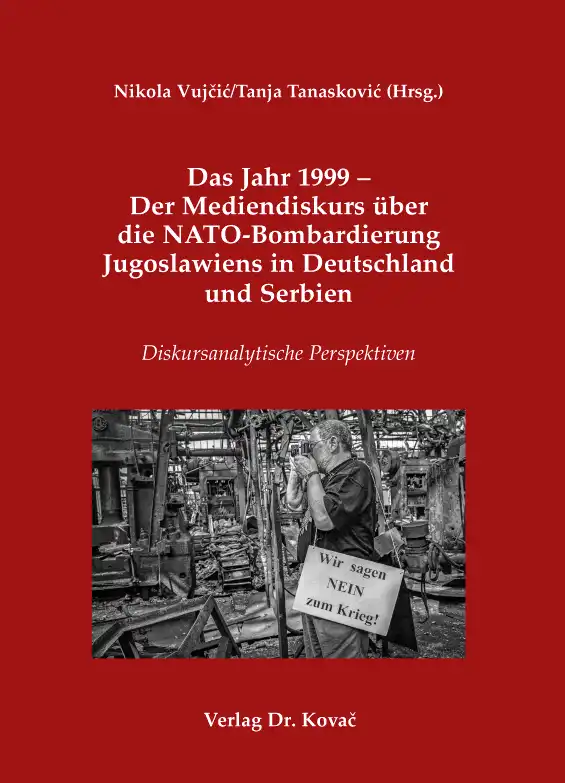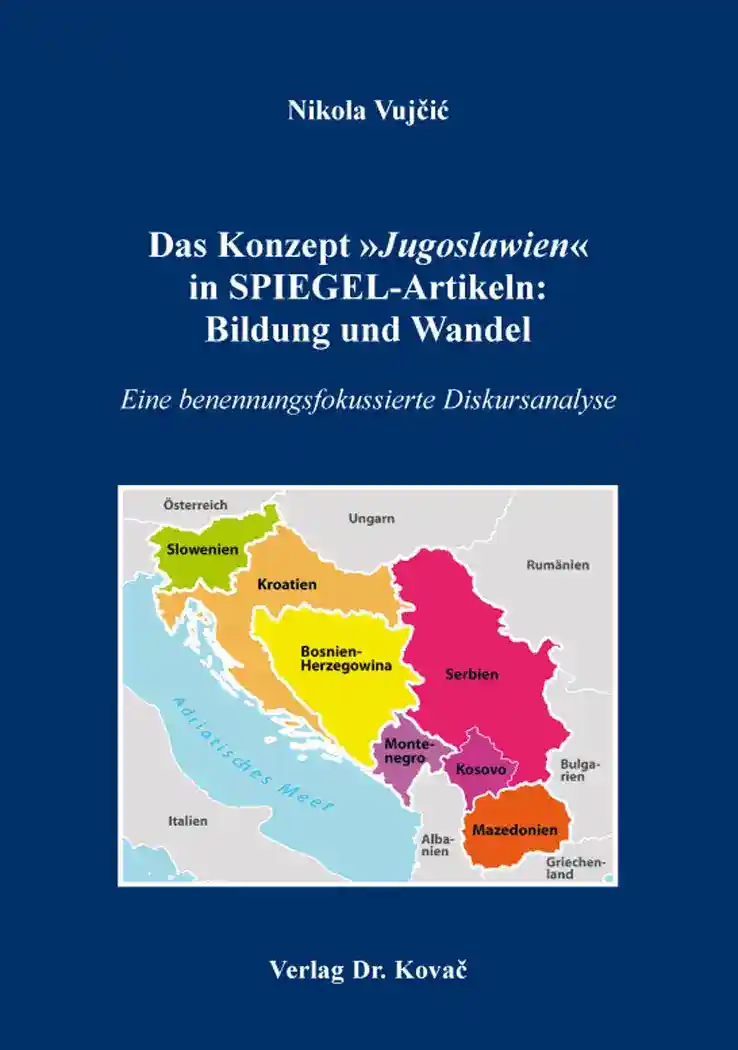Nikola Vujčić / Tanja Tanasković (Hrsg.)Das Jahr 1999 – Der Mediendiskurs über die NATO-Bombardierung Jugoslawiens in Deutschland und Serbien
Diskursanalytische Perspektiven
PHILOLOGIA – Sprachwissenschaftliche Forschungsergebnisse, Band 285
Hamburg 2025, 252 Seiten
ISBN 978-3-339-14270-2 (Print)
ISBN 978-3-339-14271-9 (eBook)
Zum Inhalt
Der NATO-Luftkrieg gegen die Bundesrepublik Jugoslawien im Frühjahr 1999 markiert einen Wendepunkt in der europäischen Nachkriegsgeschichte – politisch, gesellschaftlich und medial. Während in Deutschland der erste Kampfeinsatz der Bundeswehr nach dem Zweiten Weltkrieg öffentlich legitimiert werden musste, stand in Serbien die staatlich kontrollierte Berichterstattung im Zeichen nationaler Unifizierung und der Konstruktion von Widerstand.
Dieser interdisziplinäre Sammelband bündelt Beiträge aus Linguistik, Medienwissenschaft, Zeitgeschichte und Politikwissenschaft, die die Mediendiskurse in beiden Ländern untersuchen. Im Fokus stehen narrative Strategien, Akteurskonstruktionen, visuelle Repräsentationen und lexikalische Mittel, mit denen Krieg, Verantwortung, Schuld und Legitimität öffentlich verhandelt wurden.
Die Aufsätze zeigen, wie stark mediale Deutungsmuster nationale Selbstbilder, politische Handlungsspielräume und kollektive Erinnerungen prägen, und leisten damit einen Beitrag zur kritischen Auseinandersetzung mit einem bis heute kontrovers diskutierten Kapitel europäischer Zeitgeschichte.
- Die Diskurse über die NATO-Bombardierung Jugoslawiens 1999 – Einleitung in den Sammelband (Nikola Vujčić & Tanja Tanasković)
- “Humanitarian Intervention” or “Aggressive War”? The Intellectual Debate on the “Kosovo War” 1999 in FAZ, Süddeutsche Zeitung, taz, Der Spiegel and Die Zeit (Kurt Gritsch)
- Mnemonic Potential of Ruins: The Case of Serbia’s Generalštab (Miloš Jevtić)
- Zeitenwenden seit 25 Jahren? Deutsche Legitimationspraktiken in Bezug auf Auslandseinsätze (Swantje Köhler)
- The Year 1999 in Kosovo from the Perspective of Hegemony Theory (Raoul Ott)
- The Concept of Nato Alliance in the Daily Newspaper Politika During the Bombing of FR Yugoslavia in 1999 (Tanja Tanasković)
- The Concept of the Yugoslav Struggle against the Bombing of Yugoslavia in 1999 in the Daily Newspaper Politika (Tamara Tubić)
- Sprachliche Konstruktion von Verantwortung und Schuld im deutschen Mediendiskurs über die NATO-Bombardierung Jugoslawiens 1999 (Nikola Vujčić)
- Schlüsselwörter als Träger kollektiven Gedächtnisses – Diskurslinguistische Untersuchung der Berichterstattung der Wochenzeitungen DER SPIEGEL und DIE ZEIT über die NATO-Bombenangriffe im Jahr 1999 (Anđela Vujošević)
About the authors
Kurt Gritsch, Dr. Phil., was born in 1976 in Meran (Italy) and is a graduated historian. He worked at the Universities of Innsbruck and Lucerne and at the Institute for Cultural Research Graubünden. His research focuses on contemporary history, migration history, cultural history, conflict research, and the history of media and reception. He has published articles and books about the conflicts in the former Yugoslavia, the Arab Spring, the Cold War, contemporary European migration history and cultural history. Since 2023, he has been the Head of the Upper Engadine Cultural Archive in the Swiss canton of Graubünden. He lives in the Engadine in Switzerland.
Miloš Jevtić, PhD, is a research associate at the Institute for Political Studies, Belgrade, with a PhD in psychology. He specialised in the field of social psychology, with a focus on collective memories, social identity and belief systems that maintain interethnic antagonism. He has extensive experience in applying various qualitative and quantitative methods in empirical research. Since joining the Institute, his engagement has been characterised by participation in national and international conferences, papers in proceedings and journals, as well as collaboration on various research projects.
Swantje Köhler, M.A./M.Ed., is a research associate in the DFG-funded project “Kontroverse Diskurse. Sprachgeschichte als Zeitgeschichte seit 1990” and a lecturer in the Department of German Linguistics at the University of Trier. She is currently pursuing a PhD on legitimation practices in foreign and security policy debates on Bundeswehr missions from 1990 to 2022. Her research focuses on the discursive negotiation of democratic values such as “Freiheit” in discussions about military intervention and arms deliveries, particularly through the attribution of “Verantwortung”. Her further research interests include linguistic discourse history, contemporary history, and culturally and hermeneutically informed approaches to linguistics.
Raoul Ott, PhD, born in 1981 in Essen, Germany, became interested in the countries of Southeastern Europe while studying political science at the Philipps University in Marburg. In addition to his studies, research and private stays, he also lived and worked in the region. He worked for several years as a lecturer for German as a foreign language at the University of Kragujevac, Serbia. For his dissertation with the title “Hegemoniebildung und Elitentransformation im Kosovo” (Hegemony Formation and Elite Transformation in Kosovo) he received the award from the Institute for Political Science of the Friedrich Schiller University Jena in 2023.
Tanja Tanasković, PhD, was born in 1987. She completed her undergraduate and master’s studies (Serbian Language and Literature), as well as her doctoral studies (Linguistics), at the Faculty of Philology and Arts, University of Kragujevac, Serbia. She is employed at the Faculty of Philology and Arts (Department of Serbian Language) as an assistant professor of Serbian language. Lexicology is her primary field of interest. She has published several scholarly articles and has participated in numerous international and national linguistic conferences. She has also participated in several national linguistic projects in Serbia.
Tamara Tubić, MA, was born in 2000 in Kragujevac. She attended The First Grammar School in Kragujevac and graduated from the Faculty of Philology and Arts with a degree in Serbian language and literature. She defended her master’s thesis Phonetic Characteristics of Vowel e in the Urban Speech of Kragujevac in September 2023. She is currently pursuing a PhD in Serbian literature at the Faculty of Philology, University of Belgrade.
Nikola Vujčić, PhD, is an associate professor of German language at the Department of German Studies, Faculty of Philology and Arts, University of Kragujevac. He completed his undergraduate studies in German language and literature at the same faculty, while he pursued his master’s studies at the Faculty of Philosophy, University of Rostock, Germany, where he also obtained his doctorate in 2018. In his doctoral dissertation in the field of linguistic discourse analysis, he focused on the discourse about the dissolution of the Federal Republic of Yugoslavia. His areas of research interest include applied linguistics in a broader sense, socially engaged linguistics, lexicography, as well as semantics and pragmatics.
Anđela Vujošević, MA, born in 1994 in Peć, completed her bachelor’s and master’s studies in German language and literature at the Faculty of Philology and Arts of the University of Kragujevac. During her master's studies, she also stayed at the University of Trier as part of the Erasmus+ program. She is currently a PhD student at FILUM, where she proposed the topic of her doctoral dissertation in the scientific field of the German language under the title NATO bombing of the Federal Republic of Yugoslavia in the German and Serbian media - a contrastive analysis of the discourse on the example of the media reporting of DER SPIEGEL magazine and the weekly magazine NIN. She publishes papers in the fields of discourse analysis, semantics and contrastive linguistics.
Schlagworte
AuslandseinsätzeDer SpiegelDeutschlandDIE ZEITDiskursanalyseFAZGermanistikJugoslawienKosovo-KriegMassenmedienMediendiskursNATONATO-BombardierungPolitikaPolitikwissenschaftSerbienSüddeutsche ZeitungtazIhr Werk im Verlag Dr. Kovač
Weiteres Buch der Herausgeber
Das Konzept »Jugoslawien« in SPIEGEL-Artikeln: Bildung und Wandel
Eine benennungsfokussierte Diskursanalyse
Hamburg 2019, ISBN 978-3-339-10332-1 (Print) | ISBN 978-3-339-10333-8 (eBook)

